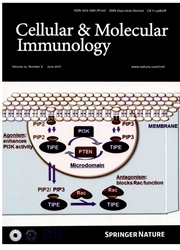

 中文摘要:
中文摘要:
Granulocyte 巨噬细胞刺激殖民地的因素(GM-CSF ) secreting 细胞的肿瘤疫苗在鼠科的模型和病人受不了癌症贡献有势力 antitumor 免疫者回答的正式就职。Hepatocellular 癌(HCC ) 是在中国的最经常、恶意的癌症之一。第一次,我们描述释放向与这类癌症作斗争代表步的疫苗的策略的 GM-CSF。在这研究,一个旁观者对鼠科的 HCC 的基于房间的 GM-CSF secreting 疫苗, Hepa1-6/B78H1-GM-CSF,与 cyclophosphamide (CY ) 的低剂量被共同管理。在与肿瘤和种痘质问以后,免疫学的试金证明细胞的 antitumor 免疫者回答高效地被激活并且肿瘤开发显著地被延迟,它依赖于有 CY 的协同作用。在鼠科的模型的 anti-HCC 疫苗的有希望的结果表明未来的可行性为在 HCC 病人的这治疗的临床的申请。
 英文摘要:
英文摘要:
Granulocyte-macrophage colony-stimulating factor (GM-CSF) secreting cellular tumor vaccines contribute to the induction of potent antitumor immune responses in murine models and patients suffering from cancers. Hepatocellular carcinoma (HCC) is one of the most frequent and malignant cancers in China. We describe, for the first time, a GM-CSF releasing vaccine strategy that represents a step toward combating this type of cancer. In this study, a bystander cell-based GM-CSF secreting vaccine against murine HCC, Hepa 1-6/B78H 1-GM-CSF, was co-administered with a low dose of cyclophosphamide (CY). After challenging with tumor and vaccination, immunological assays demonstrated that the cellular antitumor immune responses were efficiently activated and that tumor development was significantly retarded, which was dependent on synergy with CY. The promising outcome of the anti-HCC vaccine in the murine model demonstrates the feasibility of a future clinical application for this treatment in HCC patients.
 同期刊论文项目
同期刊论文项目
 同项目期刊论文
同项目期刊论文
 A bystander cell-based GM-CSF secreting vaccine synergized with a low dose of cyclophosphamide prese
A bystander cell-based GM-CSF secreting vaccine synergized with a low dose of cyclophosphamide prese IL-17A Plays a Critical Role in the Pathogenesis of Liver Fibrosis through Hepatic Stellate Cell Act
IL-17A Plays a Critical Role in the Pathogenesis of Liver Fibrosis through Hepatic Stellate Cell Act Estrogen-Sensitive PTPRO Expression Represses Hepatocellular Carcinoma Progression by Control of STA
Estrogen-Sensitive PTPRO Expression Represses Hepatocellular Carcinoma Progression by Control of STA Evaluation of Epstein-Barr Virus Latent Membrane Protein 2 Specific T-Cell Receptors Driven by T-Cel
Evaluation of Epstein-Barr Virus Latent Membrane Protein 2 Specific T-Cell Receptors Driven by T-Cel Reconstituted complexes of mycobacterial HSP70 and EBV LMP2A-derived peptides elicit peptide-specifi
Reconstituted complexes of mycobacterial HSP70 and EBV LMP2A-derived peptides elicit peptide-specifi Immunotherapy of Epstein-Barr Virus Associated Malignancies Using Mycobacterial HSP70 and LMP2A(356-
Immunotherapy of Epstein-Barr Virus Associated Malignancies Using Mycobacterial HSP70 and LMP2A(356- Circulation long non-coding RNAs act as biomarkers for predicting tumorigenesis and metastasis in he
Circulation long non-coding RNAs act as biomarkers for predicting tumorigenesis and metastasis in he Survival and inflammation promotion effect of PTPRO in fulminant hepatitis is associated with NF-kap
Survival and inflammation promotion effect of PTPRO in fulminant hepatitis is associated with NF-kap Estrogen ‐ sensitive PTPRO expression represses hepatocellular carcinoma progression by control of S
Estrogen ‐ sensitive PTPRO expression represses hepatocellular carcinoma progression by control of S Inhibition of MTA1 by ERalpha contributes to protection hepatocellular carcinoma from tumor prolifer
Inhibition of MTA1 by ERalpha contributes to protection hepatocellular carcinoma from tumor prolifer 期刊信息
期刊信息
